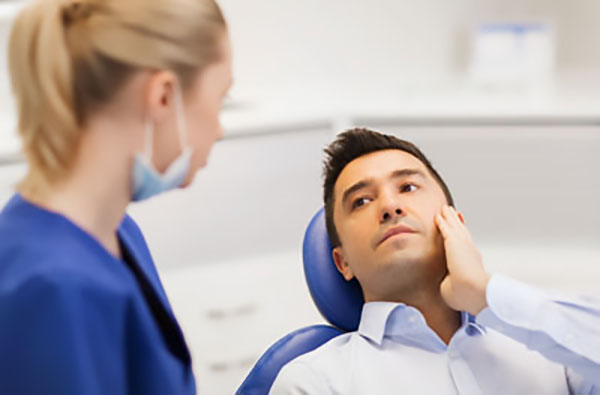A Dentist Explains How to Know Whether You Grind Your Teeth

Do you think you might be grinding your teeth and are looking for a dentist's opinion? Have you ever woken up with a stiff or sore jaw? Do you have a dull, throbbing headache upon waking in the morning?
If so, it may be time for you to visit your dentist. Both of these scenarios are telltale signs that you are grinding your teeth while you sleep. Medically termed bruxism, grinding your teeth can lead to serious oral health issues if not addressed by your dentist.
What is bruxism?
Bruxism, commonly known as teeth grinding, is a condition in which you grind or clench your teeth. This can happen unconsciously while you are awake, or during sleep. In cases of clenching and grinding while asleep, this condition is considered a sleep-related movement disorder. It has been shown that people who have sleep bruxism are more likely to have other sleep disorders, such as snoring or sleep apnea.
How to tell if you grind your teeth
If you suspect you are suffering from bruxism, there are several signs to look out for:
- Tight or sore jaw muscles
- Flattened teeth
- Cracked, chipped, or loose teeth
- Tooth pain or sensitivity
- Dull, achy pain around your ears or temples
- Temporomandibular joint (TMJ) pain, clicking or grinding when opening your mouth
If you are noticing any of these signs or symptoms, the easiest way to confirm whether you are grinding your teeth is by visiting your dentist for an official diagnosis.
Causes of teeth grinding
There are a variety of reasons why people grind their teeth. It is not entirely known what causes bruxism, but it is thought to be due to a combination of physical, psychological and genetic factors. These can include stress and anxiety, an abnormal bite, aggressive or competitive personality types, missing or crooked teeth, other family members with bruxism, or medical disorders such as Parkinson’s disease, epilepsy, gastroesophageal reflux disorder (GERD), or attention-deficit/hyperactivity disorder (ADHD).
Bruxism may also be a side effect of some medications, such as certain antidepressants.
How can your dentist help?
Your dentist is the first person you should visit if you suspect that you are grinding your teeth. During a dental exam, your dentist will look for signs of bruxism such as excessive wear on your teeth, including cracks, chips or loose teeth. Some options to help you reduce or eliminate grinding include:
- Wearing a mouth guard to protect your teeth
- Wearing a splint, which keeps your teeth separated
- Wearing a Mandibular Advancement Device (MAD) to keep your jaw in a fixed position
- Avoid alcohol — alcohol has been shown to intensify grinding during sleep
- Cut back on or avoid foods that contain caffeine
- Use stress management techniques
- Behavioral therapy — training yourself to hold your jaw and mouth in a position to avoid grinding
The good news
The good news is that bruxism, or grinding your teeth, is a very treatable condition. If you suspect that you are grinding your teeth, visit your dentist as soon as possible to discuss your options for reducing or eliminating bruxism. The sooner you catch and treat this condition, the less pain and damage you will endure.
Request an appointment here: https://www.drkhorsand.com or call Khorsand Dental Group at (760) 394-3082 for an appointment in our El Centro office.
Check out what others are saying about our services on Yelp: Read our Yelp reviews.
Related Posts
Dental restoration is key to the success and appearance of dental implants. After a dental implant is placed, you must select the appropriate restoration to complete the process and restore both the function and appearance of your smile. Various options are available, each with its benefits depending on your needs and the condition of your…
Dental bonding is a fast, cost-effective way to correct small flaws and elevate a smile without extensive procedures. This treatment uses tooth-colored resin that the dentist sculpts directly on the tooth in one visit, preserving healthy enamel and delivering an immediate boost in confidence. Fixing small chips, closing minor gaps, and softening uneven edges are…
If your teenager is in need of teeth straightening services, it is a good idea to look for an Invisalign® dentist. The two main types of teeth straightening options that teenagers are choosing nowadays are Invisalign® aligners and traditional metal braces. If your teenager is interested in getting Invisalign® clear aligners, then all you need…
Giving a child early orthodontics can help to eliminate unnecessary work. It can also reduce the number of needed extractions or surgery. Sometimes, a child may need orthodontics as early as the age of seven. Because every child is different, some may need earlier treatment than others. Bringing your child to an orthodontic evaluation by…
